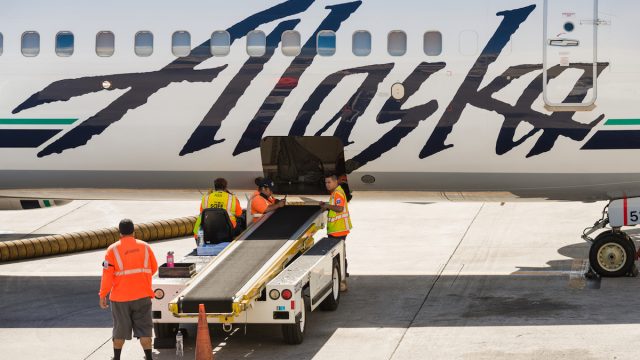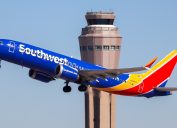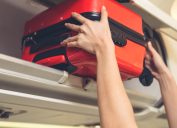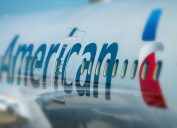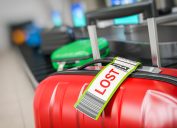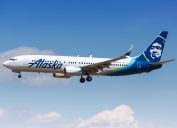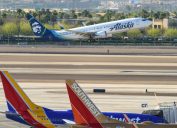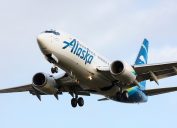Alaska Airlines Raising Baggage Fees Means Other Carriers Will Follow, Experts Warn
Experts say the uptick in luggage fees could have a domino effect on the industry.
When exploring the lush regions of the Pacific Northwest, Alaska Airlines can be the quickest and most efficient way to get there. However, the next time you're booking a fun weekend getaway to Seattle, Spokane, Bozeman, or the sandy beaches along the Oregon coast, you may want to reconsider your packing method. Over the weekend, Alaska quietly updated its luggage policy page to reflect the company's new—and pricier—checked baggage fees, which will go into effect in the new year.
RELATED: Travel Expert Reveals the Sneaky Reason Airlines Make You Check Your Carry-On.
Currently, Alaska passengers pay $30 for their first checked bag. But come Jan. 2, 2024, travelers will be charged $35 for their first piece of checked luggage. The cost of a second checked bag will also increase by $5, going from $40 to $45.
The fees for additional checked bags, as well as oversized/overweight luggage, will remain the same. Additionally, first-class ticket holders and Alaska Airlines Visa credit card and Alaska Airlines Visa Business card users will still get free checked luggage. If you have MVP, MVP Gold, or MVP Gold 75K or 100K status, you'll also get to check your bags at no cost.
A spokesperson for the Seattle-based airline confirmed the fee increase in an email to Thrifty Traveler: "As we navigate rising operating costs—including high fuel prices—we occasionally need to adjust our fee structure to maintain a high level of excellence in the service we provide."
For many flyers, however, the price increase isn't anything new. In 2020, JetBlue raised its checked baggage fees to $35 and $45, respectively, for first and second bags—but the latter is now $60, per the airline's website. Earlier this year, American Airlines began charging all basic economy ticket holders on a transoceanic flight $75 for their first checked bag; it was previously free.
However, compared to other major U.S. airlines such as Southwest and Delta, who still charge $30 for your first standard checked bag, the price hike is surprising. In fact, experts warn that Alaska's new baggage fees may ruffle some feathers and inspire other airlines to do the same.
"I would not be surprised to see other carriers raise their baggage fees in due time," Tim Jue, a San Francisco-based aviation and travel reporter, told The Points Guy. "The airline industry likes to act in unison, and if there's an opportunity to increase revenue somewhere, it's a sure-fire bet airlines will capitalize on it. All it takes is one carrier to take that leap of faith and everyone else usually piles on immediately afterwards."
Jue added that he wouldn't be surprised to see an uptick in baggage fees across most major airlines "in the coming days or weeks."
"The cost of doing business for most airlines is going up, and we're going to start seeing carriers look to extract more money out of their customers," Jue warned. "I think baggage fees are just the start of that effort, and I'd expect other carriers to quietly raise their checked bag fees in the coming days or weeks."
Brian Sumers, an air travel expert and writer at the Airline Observer newsletter, argues that raising baggage fees could incentivize passengers to open a new credit card that comes with free checked luggage as a bonus perk.
"In raising their baggage fees, airlines may be trying to grab cash from consumers in the form of fees. But just as likely, they are trying to coax some travelers into getting a new credit card, which—you guessed it—comes with 'free' checked luggage. As bag fees climb up, a credit card becomes a more enticing deal," Sumers explained to The Points Guy.
